The Hung Kings Temple Complex plays a pivotal role in modern Vietnamese national identity by serving as a powerful symbol of unity, cultural heritage, and the nation’s origin. SIXT.VN offers curated travel experiences that allow you to explore this integral part of Vietnam’s history and culture. By visiting this sacred site, you gain a deeper understanding of Vietnamese values, traditions, and the collective memory that binds the nation together.
1. Understanding the Historical Significance of the Hung Kings
What is the historical significance of the Hung Kings in Vietnamese culture?
The Hung Kings are considered the founders of Vietnam, and their reign marks the beginning of Vietnamese civilization. According to Vietnamese legends, the Hung Kings ruled Van Lang, the first Vietnamese kingdom, starting around 2879 BC. Their story begins with the mythical union of Lac Long Quan, a dragon lord, and Au Co, a mountain fairy, who are considered the ancestors of all Vietnamese people. The eldest of their 100 children became the first Hung King, initiating a dynasty that spanned 18 generations and laid the groundwork for modern Vietnam.
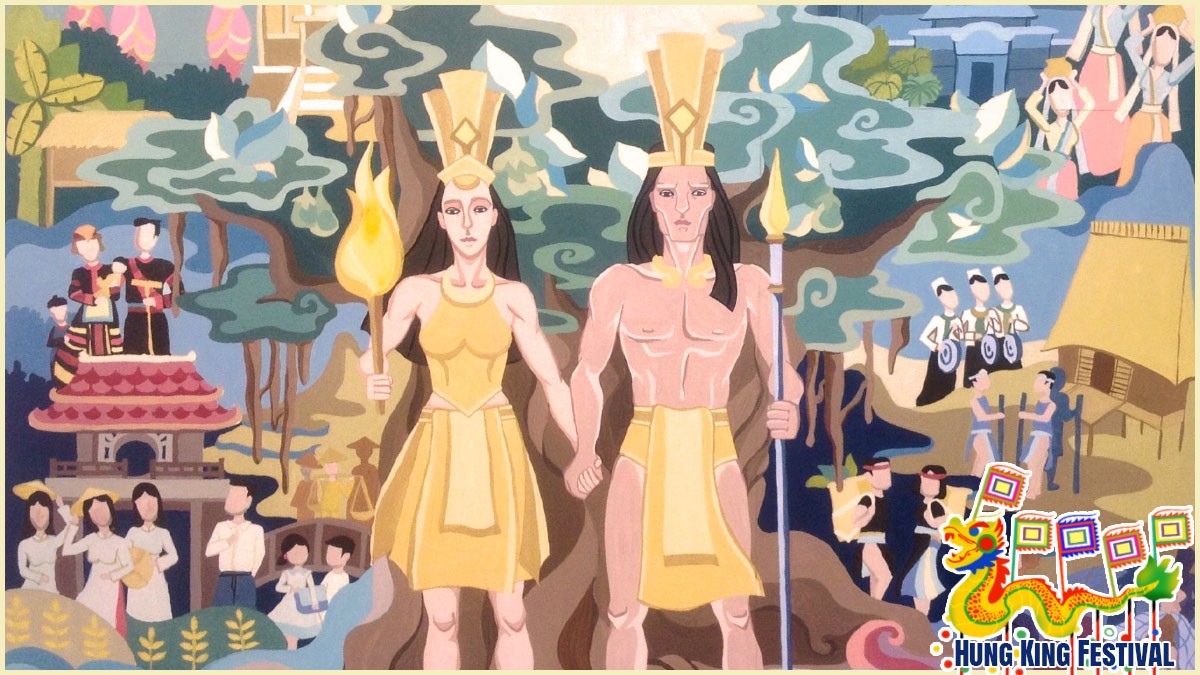 Historical perspective of the Hung Kings
Historical perspective of the Hung Kings
The Hung Kings are more than just historical figures; they are the spiritual guardians of Vietnam’s heritage. The saying “Uong nuoc nho nguon” (When you drink water, remember the source) encapsulates the deep respect and gratitude the Vietnamese people have for their ancestors. This reverence underscores the enduring importance of the Hung Kings in shaping Vietnam’s cultural identity and national pride. According to research from the Vietnamese Academy of Social Sciences in 2018, the Hung Kings’ era is not only a historical period but also a symbol of national unity and cultural pride, reinforcing the importance of remembering and honoring the nation’s origins.
2. Exploring the Hung Kings Temple Complex: A Sacred Site
Where is the Hung Kings Temple Complex located, and what does it consist of?
The Hung Kings Temple Complex is located on Nghia Linh Mountain in Phu Tho Province, Northern Vietnam, and it is the ancestral home of the Hung Kings. The complex comprises four main temples: the Lower Temple (Den Ha), the Central Temple (Den Trung), the Upper Temple (Den Thuong), and the Well Temple (Den Gieng).
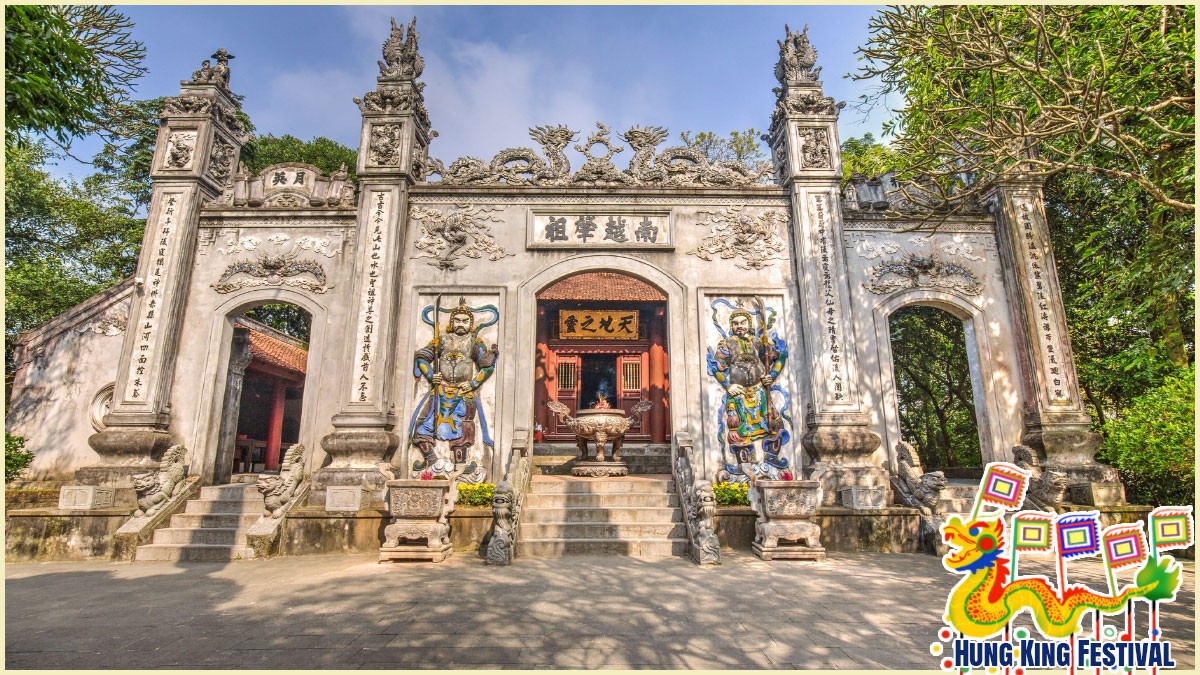 The Hung Kings Temple Complex in Phu Tho Province
The Hung Kings Temple Complex in Phu Tho Province
Each temple holds unique significance and is part of the larger narrative of Vietnamese history and culture. The site is not only a place of worship but also a memorial complex dedicated to Vietnam’s founding fathers and historical figures. Annually, the complex attracts countless Vietnamese people who pay their respects through traditional offerings and ceremonies, reinforcing a deep connection to their roots. According to the Phu Tho Province Department of Culture, Sports, and Tourism in 2020, the Hung Kings Temple Complex attracts over six million visitors annually, highlighting its central role in Vietnamese spiritual and cultural life. SIXT.VN ensures seamless transportation to and from this revered site, allowing visitors to fully appreciate its historical and cultural value.
3. Understanding the Significance of the Hung King Festival
What is the significance of the Hung King Festival in Vietnamese culture?
The Hung King Festival, held annually on the 10th day of the 3rd lunar month (usually in April), is a major national holiday in Vietnam, serving as a time for Vietnamese people to come together and celebrate their shared heritage. During this festival, many Vietnamese people make pilgrimages to the Hung Kings Temple, while others honor their ancestors at home, creating a unified national homage to Vietnam’s founding fathers. The festival is more than just a historical commemoration; it is a vibrant expression of national identity and cultural pride.
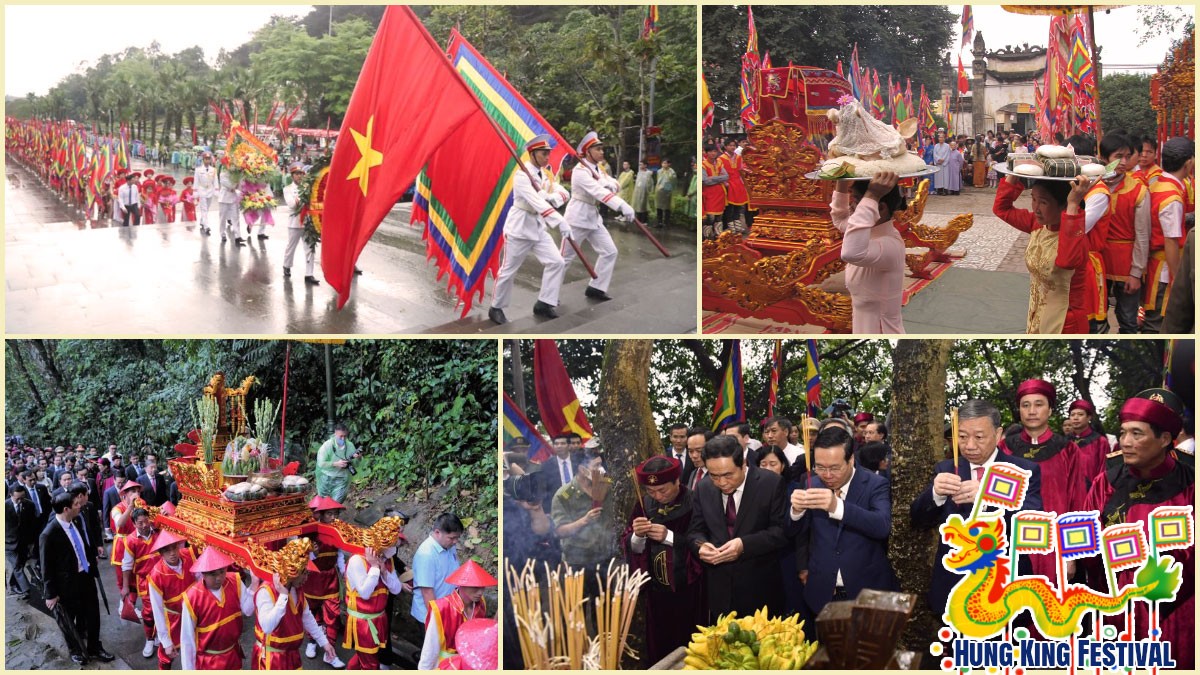 Hung King Festival is a national holiday
Hung King Festival is a national holiday
The Hung King Festival underscores the values of ancestor worship, national unity, and cultural preservation, reinforcing the importance of remembering the nation’s origins. According to a 2019 report by the Vietnam National Administration of Tourism, the Hung King Festival significantly boosts domestic tourism and cultural awareness, attracting millions of participants each year. With SIXT.VN, you can experience this vibrant festival firsthand, with convenient travel options and accommodations that ensure a memorable cultural immersion.
4. Exploring the Rituals and Ceremonies of the Hung King Festival
What rituals and ceremonies are performed during the Hung King Festival?
The Hung King Festival is celebrated with various rituals and ceremonies that highlight Vietnamese culture and traditions. The festival begins at dawn with the sounds of bronze drums and gongs, creating a solemn atmosphere for prayers and incense offerings. Traditional Vietnamese lion and dragon dances are performed, marking the official commencement of the ceremony.
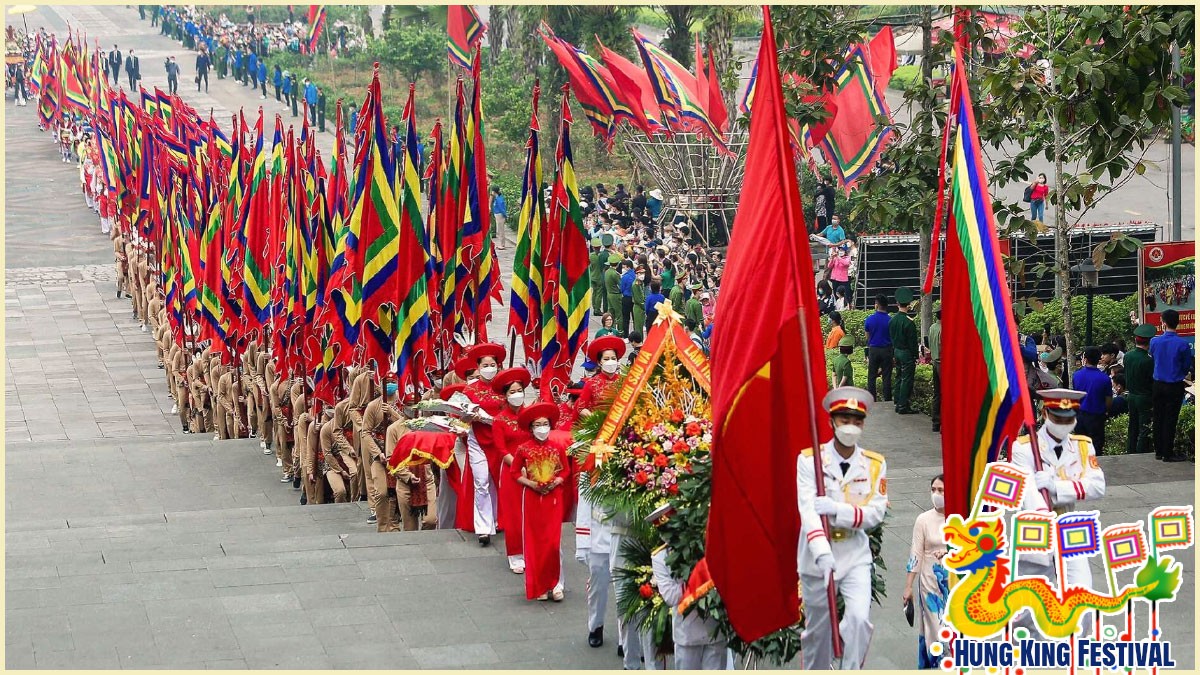 Ceremonies of the Hung King Festival
Ceremonies of the Hung King Festival
The Palanquin Procession (Le Ruoc Kieu) is a central event, involving entire villages in a grand parade where participants, including government officials and local families, dress in traditional attire and carry precious offerings. The procession moves in sync to ancient ceremonial music, showcasing a mesmerizing display of Vietnamese culture. The incense offering ritual (Le Dang Huong) is another sacred moment, where elders, pilgrims, and state leaders offer incense to the Hung Kings and the legendary ancestral parents of the Vietnamese people, Lac Long Quan and Au Co. The ceremony concludes with state officials paying tribute to the Hung Kings and declaring the start of the festivities.
These rituals and ceremonies reflect the deep respect and reverence the Vietnamese people hold for their ancestors and their cultural heritage. According to UNESCO, the worship of Hung Kings was recognized as an Intangible Cultural Heritage of Humanity in 2012, emphasizing its cultural and historical significance. SIXT.VN offers guided tours that provide insight into these rituals, ensuring a meaningful and respectful experience for visitors.
5. Indulging in Festivities: Games and Performances at the Hung King Festival
What festivities, games, and performances are featured during the Hung King Festival?
After the solemn ceremonies, the Hung King Festival transitions into a lively celebration featuring traditional music, games, and performances. The air is filled with the sound of Xoan singing, a UNESCO-recognized art form that encapsulates Vietnamese cultural heritage. Traditional games are a significant part of the festivities, with young people competing in activities such as blind-man’s buff, tug-of-war, and contests for making Banh Chung and Banh Giay.
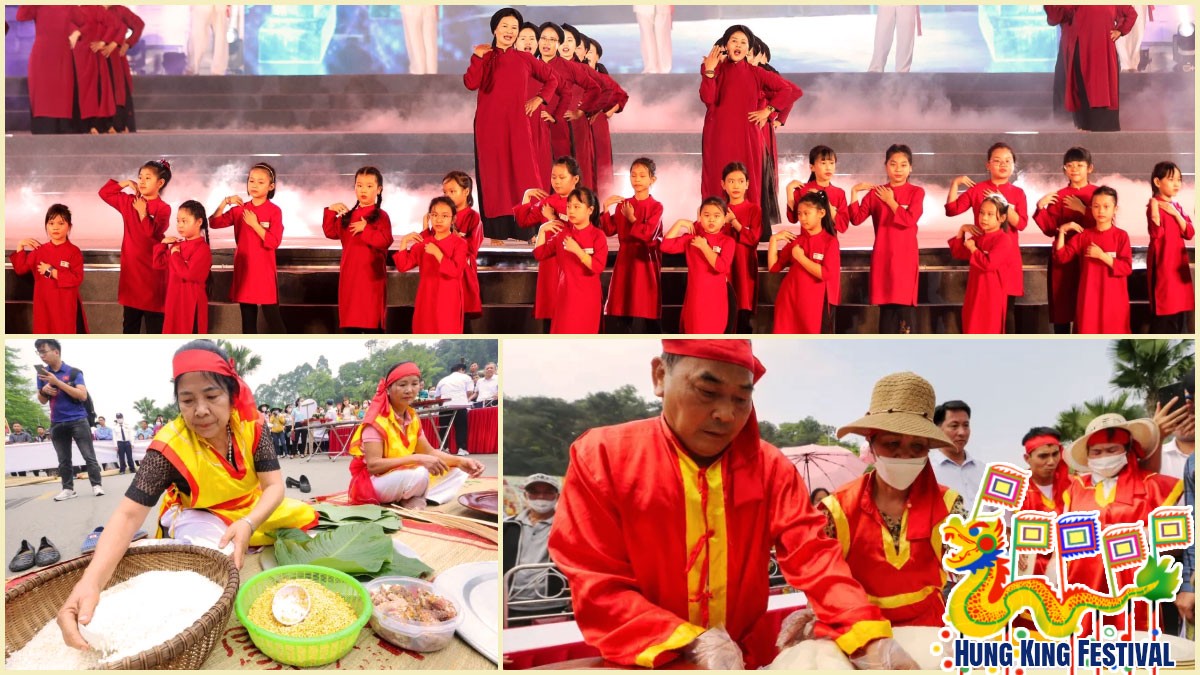 Festivities of the Hung King Festival
Festivities of the Hung King Festival
One of the most entertaining events is the water-based game of catching ducks and eels. Local vendors offer a variety of Vietnamese delicacies, adding to the festive atmosphere. The games and performances provide entertainment and foster a sense of community and cultural pride. According to cultural researchers at the Institute for Vietnamese Culture and Arts Studies, these activities help preserve and promote traditional Vietnamese values and customs. SIXT.VN provides travel packages that allow you to participate in these festivities, offering a fun and immersive cultural experience.
6. The Role of the Hung Kings in Modern Vietnamese Education
How are the Hung Kings and their legacy taught in Vietnamese schools?
The Hung Kings and their legacy are integral to the Vietnamese education system, taught from primary school through higher education to instill a sense of national identity and cultural pride. Textbooks and curricula emphasize the Hung Kings as the founders of the nation, highlighting their contributions to Vietnamese civilization and cultural heritage. Students learn about the legends of Lac Long Quan and Au Co, the establishment of Van Lang, and the various achievements and cultural practices attributed to the Hung Kings era.
Image depicts students learning about the Hung Kings at school
Educational activities, such as school trips to the Hung Kings Temple Complex and cultural performances, reinforce the importance of the Hung Kings in Vietnamese history and culture. The emphasis on ancestral veneration and national unity promotes a strong sense of patriotism and cultural identity among students. According to a 2021 report by the Ministry of Education and Training, the integration of the Hung Kings’ history into the curriculum aims to cultivate a deep appreciation for Vietnamese heritage and values among the younger generation. SIXT.VN supports educational tourism by offering resources and travel services for schools and educational groups, facilitating meaningful learning experiences about Vietnamese history and culture.
7. Impact on Vietnamese Arts and Literature
How do the Hung Kings and their era influence Vietnamese arts and literature?
The Hung Kings and their era serve as a significant source of inspiration for Vietnamese arts and literature, influencing various forms of artistic expression, including literature, music, theater, and visual arts. Traditional folk tales, poems, and songs recount the legends of the Hung Kings, celebrating their heroic deeds and contributions to Vietnamese civilization. Historical dramas and theatrical performances depict key events from the Hung Kings era, bringing the stories to life for modern audiences. Visual arts, such as paintings and sculptures, often depict scenes from the Hung Kings’ reign, serving as visual reminders of Vietnam’s ancient origins.
Image depicts a painting of Hung Kings offering
The influence of the Hung Kings extends beyond traditional art forms, inspiring contemporary artists and writers to create works that explore themes of national identity, cultural heritage, and ancestral veneration. This cultural representation reinforces the significance of the Hung Kings in Vietnam’s collective memory and cultural consciousness. According to the Vietnam National Institute of Culture and Arts Studies, the Hung Kings’ legacy is a recurring theme in Vietnamese artistic and literary works, reflecting their enduring importance in shaping the nation’s cultural landscape. SIXT.VN provides access to cultural tours and performances that showcase the artistic and literary representations of the Hung Kings, enhancing visitors’ understanding and appreciation of Vietnamese culture.
8. The Hung Kings and Vietnamese Diaspora
How do Vietnamese communities abroad maintain connections to the Hung Kings and their heritage?
Vietnamese communities abroad maintain strong connections to the Hung Kings and their heritage through various cultural and religious activities. Overseas Vietnamese often establish temples and cultural centers dedicated to the Hung Kings, serving as focal points for community gatherings and ancestral veneration. Cultural events and festivals, such as the Hung King Festival, are celebrated in Vietnamese diaspora communities around the world, reinforcing a sense of shared identity and cultural heritage.
Image depicts overseas Vietnamese celebrating the Hung Kings Festival
Educational programs and language schools for Vietnamese children in the diaspora often include lessons on Vietnamese history and culture, ensuring that younger generations learn about the Hung Kings and their significance. These efforts help preserve and transmit Vietnamese cultural traditions to future generations, maintaining a strong connection to their ancestral homeland. According to research from the Committee for Overseas Vietnamese Affairs, cultural preservation efforts play a crucial role in strengthening the ties between Vietnamese communities abroad and their homeland. SIXT.VN supports cultural exchange programs and diaspora tourism, facilitating opportunities for overseas Vietnamese to reconnect with their cultural roots and explore the Hung Kings Temple Complex.
9. The Political Dimensions of the Hung Kings
How do the Vietnamese government and political system utilize the legacy of the Hung Kings?
The Vietnamese government and political system strategically utilize the legacy of the Hung Kings to promote national unity, cultural identity, and political legitimacy. Official ceremonies and commemorations at the Hung Kings Temple Complex are attended by government leaders, symbolizing the state’s recognition and endorsement of the Hung Kings as national founders. The government promotes the Hung Kings as symbols of Vietnamese resilience, independence, and cultural heritage, fostering a sense of national pride and patriotism.
Image depicts Vietnamese government leaders attending a Hung Kings ceremony
The legacy of the Hung Kings is often invoked in political speeches and state-sponsored media to reinforce national identity and unity, particularly in times of social or political challenges. The emphasis on ancestral veneration and national solidarity aligns with the government’s broader efforts to strengthen social cohesion and national identity. According to political analysts at the Institute of Southeast Asian Studies, the strategic use of the Hung Kings’ legacy helps legitimize the government’s authority and promote social stability. SIXT.VN provides information and resources for understanding the political and cultural context of the Hung Kings’ legacy, offering visitors a comprehensive perspective on Vietnamese society.
10. Contemporary Challenges and the Future of the Hung Kings’ Legacy
What are the contemporary challenges in preserving and promoting the legacy of the Hung Kings, and what are the future prospects?
Contemporary challenges in preserving and promoting the legacy of the Hung Kings include balancing modernization with cultural preservation, addressing issues of historical accuracy and interpretation, and ensuring that the legacy remains relevant to younger generations. The rapid pace of modernization and globalization poses a threat to traditional cultural practices and values, requiring proactive efforts to preserve and promote the Hung Kings’ legacy in a changing society.
Image depicts contemporary celebrations at the Hung Kings Temple Complex
Ensuring historical accuracy and addressing conflicting interpretations of the Hung Kings’ era requires careful scholarly research and public education. Engaging younger generations in the legacy of the Hung Kings through innovative educational programs and digital media is essential for its continued relevance and transmission. The future prospects for the Hung Kings’ legacy depend on collaborative efforts between government agencies, cultural institutions, and local communities to preserve, promote, and adapt the legacy to contemporary contexts. According to cultural heritage experts at the Vietnam Cultural Heritage Association, sustainable cultural tourism and community-based initiatives can play a vital role in preserving and promoting the Hung Kings’ legacy for future generations. SIXT.VN is committed to supporting sustainable tourism practices and community engagement, ensuring that visitors can experience the Hung Kings Temple Complex in a responsible and culturally sensitive manner.
11. How the Hung Kings Temple Complex Unites Vietnamese People
In what ways does the Hung Kings Temple Complex serve as a unifying force for Vietnamese people, both domestically and abroad?
The Hung Kings Temple Complex serves as a powerful unifying force for Vietnamese people, both domestically and abroad, by providing a central place of pilgrimage and remembrance. The annual Hung King Festival brings together millions of Vietnamese people from all walks of life to honor their ancestors and celebrate their shared heritage. The complex is a symbol of national identity and cultural pride, fostering a sense of unity and solidarity among Vietnamese people.
The shared experience of visiting the Hung Kings Temple Complex, participating in ceremonies, and reflecting on their ancestral roots strengthens the bonds that connect Vietnamese people across generations and geographical boundaries. The complex serves as a reminder of their common history, cultural values, and national aspirations, reinforcing a sense of collective identity and purpose. According to sociologists at the Vietnam Academy of Social Sciences, the Hung Kings Temple Complex plays a crucial role in maintaining social cohesion and cultural continuity in Vietnamese society. SIXT.VN facilitates travel and accommodations for visitors to the Hung Kings Temple Complex, supporting cultural exchange and community engagement.
12. Architectural and Artistic Significance of the Hung Kings Temple Complex
What are the key architectural and artistic features of the Hung Kings Temple Complex, and what do they symbolize?
The Hung Kings Temple Complex features traditional Vietnamese architectural styles, reflecting the cultural and historical context of the Hung Kings era. The temples are designed with intricate carvings, ornate decorations, and traditional Vietnamese motifs, showcasing the artistic craftsmanship of the period. The architecture of the complex blends harmoniously with the natural landscape of Nghia Linh Mountain, creating a serene and spiritual atmosphere.
Image depicts the Upper Temple (Den Thuong) at the Hung Kings Temple Complex
Each temple within the complex has unique architectural features and artistic details, symbolizing different aspects of Vietnamese history, culture, and spirituality. The Lower Temple (Den Ha) is associated with the legend of Au Co giving birth to 100 children, symbolizing the origin of the Vietnamese people. The Central Temple (Den Trung) is believed to be where the Hung Kings discussed state affairs, representing the political and administrative functions of the kingdom. The Upper Temple (Den Thuong) is where the Hung Kings performed religious rituals, symbolizing the spiritual and cultural significance of the dynasty. The Well Temple (Den Gieng) is associated with the princesses Ngoc Hoa and Tien Dung, reflecting themes of love, beauty, and family. According to architectural historians at the Vietnam Institute of Architecture, the Hung Kings Temple Complex is a masterpiece of Vietnamese traditional architecture, showcasing the country’s rich cultural heritage. SIXT.VN offers guided tours that provide detailed insights into the architectural and artistic features of the complex, enhancing visitors’ appreciation of Vietnamese culture.
13. The Role of the Hung Kings Temple Complex in Promoting Tourism
How does the Hung Kings Temple Complex contribute to tourism in Phu Tho province and Vietnam as a whole?
The Hung Kings Temple Complex is a major tourist attraction in Phu Tho province and Vietnam, contributing significantly to the local economy and promoting cultural tourism. The complex attracts millions of visitors each year, generating revenue for local businesses, including hotels, restaurants, and transportation services. The Hung King Festival is a peak tourist season, drawing domestic and international tourists to experience the cultural festivities and historical significance of the site.
The temple complex is a key component of Vietnam’s cultural tourism strategy, showcasing the country’s rich history, traditions, and ancestral heritage. The promotion of the Hung Kings Temple Complex as a tourist destination helps raise awareness of Vietnamese culture and attracts visitors interested in learning about the country’s history and traditions. According to tourism officials in Phu Tho province, the Hung Kings Temple Complex is a driving force for economic growth and cultural preservation in the region. SIXT.VN offers travel packages that include visits to the Hung Kings Temple Complex, supporting sustainable tourism and local economic development.
14. How the Complex Adapts to Modern Times
In what ways is the Hung Kings Temple Complex adapting to modern times while still preserving its historical and cultural integrity?
The Hung Kings Temple Complex is adapting to modern times through various initiatives that enhance visitor experience, promote cultural awareness, and preserve its historical and cultural integrity. The complex has implemented modern amenities and facilities, such as improved transportation infrastructure, visitor centers, and interpretive displays, to accommodate increasing numbers of tourists. Digital technologies, including interactive exhibits, virtual tours, and online resources, are used to engage younger audiences and provide educational content about the Hung Kings and their era.
Image depicts modern visitors at the Hung Kings Temple Complex
Cultural preservation efforts focus on restoring and maintaining the architectural integrity of the temples, promoting traditional ceremonies and rituals, and supporting local artisans and cultural practitioners. Sustainable tourism practices are implemented to minimize the environmental impact of tourism and ensure that the complex remains a viable cultural heritage site for future generations. According to heritage conservation experts at the Vietnam National Museum of History, balancing modernization with cultural preservation requires careful planning, community engagement, and sustainable management practices. SIXT.VN supports responsible tourism and cultural preservation by promoting ethical travel practices and partnering with local communities to protect the Hung Kings Temple Complex.
15. Visiting the Hung Kings Temple Complex: Essential Travel Tips
What essential travel tips should visitors keep in mind when planning a trip to the Hung Kings Temple Complex?
When planning a trip to the Hung Kings Temple Complex, visitors should keep several essential travel tips in mind to ensure a smooth and meaningful experience. The best time to visit is during the Hung King Festival in April, but be prepared for large crowds and book accommodations and transportation in advance. Dress modestly and respectfully when visiting the temples, covering shoulders and knees, and remove shoes before entering the sacred spaces.
Image depicts respectful attire for visiting temples in Vietnam
Learn about the history and cultural significance of the Hung Kings and the temple complex to enhance your understanding and appreciation of the site. Participate in the ceremonies and festivities with respect and reverence, following local customs and traditions. Hire a local guide to provide insights into the history, architecture, and cultural practices associated with the complex. Support local businesses and artisans by purchasing souvenirs and handicrafts made in the region. Be mindful of the environment and dispose of waste responsibly, contributing to the sustainable preservation of the site. According to travel experts at SIXT.VN, planning ahead and respecting local customs are key to a rewarding and memorable visit to the Hung Kings Temple Complex.
SIXT.VN: Your Gateway to Exploring Vietnamese Culture
SIXT.VN offers a comprehensive range of services to make your trip to Vietnam and the Hung Kings Temple Complex seamless and unforgettable. From airport transfers and hotel bookings to guided tours and cultural experiences, we provide everything you need to immerse yourself in Vietnamese culture. Overcome the challenges of planning your trip with our expert travel advice and tailored itineraries.
Address: 260 Cau Giay, Hanoi, Vietnam
Hotline/Whatsapp: +84 986 244 358
Website: SIXT.VN
Don’t miss the opportunity to explore the Hung Kings Temple Complex and discover the heart of Vietnamese national identity. Contact SIXT.VN today to start planning your cultural adventure.
FAQ: The Hung Kings Temple Complex
1. What is the Hung Kings Temple Complex?
The Hung Kings Temple Complex is a historical and spiritual site in Phu Tho Province, Vietnam, dedicated to the Hung Kings, who are considered the founders of the Vietnamese nation.
2. Where is the Hung Kings Temple Complex located?
The complex is located on Nghia Linh Mountain in Phu Tho Province, Northern Vietnam.
3. When is the Hung King Festival celebrated?
The Hung King Festival is celebrated annually on the 10th day of the 3rd lunar month (usually in April).
4. Why is the Hung King Festival important?
The festival is important because it honors the Hung Kings, who are considered the founders of Vietnam, and it is a time for Vietnamese people to celebrate their shared heritage.
5. What are the key features of the Hung Kings Temple Complex?
The complex includes four main temples: the Lower Temple (Den Ha), the Central Temple (Den Trung), the Upper Temple (Den Thuong), and the Well Temple (Den Gieng), each with unique architectural and historical significance.
6. What types of ceremonies are held at the Hung Kings Temple Complex?
Ceremonies include prayers, incense offerings, lion and dragon dances, a palanquin procession (Le Ruoc Kieu), and an incense offering ritual (Le Dang Huong).
7. What kind of activities and games take place during the Hung King Festival?
Activities include traditional music performances like Xoan singing, and games such as blind-man’s buff, tug-of-war, and contests for making Banh Chung and Banh Giay.
8. How does the Hung Kings Temple Complex contribute to Vietnamese national identity?
The complex serves as a symbol of national unity, cultural heritage, and ancestral veneration, fostering a sense of shared identity and pride among Vietnamese people.
9. How is the Hung Kings’ legacy preserved in modern Vietnam?
The Hung Kings’ legacy is preserved through education, cultural events, government initiatives, and community-based activities, ensuring its continued relevance and transmission to future generations.
10. What travel tips should visitors keep in mind when visiting the Hung Kings Temple Complex?
Visitors should dress modestly, respect local customs, learn about the history of the site, participate respectfully in ceremonies, and support local businesses.



